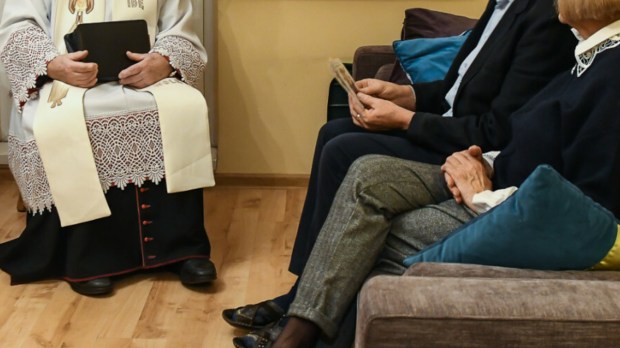In Poland, there is a tradition in parishes of the priests making pastoral visits to parishioners in their houses during the Christmas season. This often arouses a range of feelings, sometimes conflicting ones. For some it’s an expected and desired visit. For others it’s an encounter with someone they don’t really know, and for still others it’s an unpleasant run-in with uncomfortable questions. Couples who live together without being married in the Church may more easily experience this last situation. Things, however, can take a completely different turn!
A man named Mateusz shared with me his story of a pastoral visit that took place in his home and that changed his life.
“A few years ago I was in a relationship with a divorced woman,” he recalls. “I was leading a life of sin. This situation was particularly saddening for my partner’s grandmother. The old woman was deeply religious and suffered greatly due to our situation. She wanted us to get married, but we couldn’t because of our situation.”
Marriage is for life. At the end of the marriage vows, the words “till death do us part” (or their equivalent) are spoken. However, life throws various scenarios at us that no one had planned in advance. Sometimes, the marriage has been null and void from the beginning – that is to say, no matter how pretty the ceremony was, and regardless of what the legal papers may say, the sacrament never actually took place.
The priest’s proposal
Many people associate nullity with divorce. However, these are two very different situations. An annulment is the confirmation, after an investigation by the ecclesiastical authority, that the sacrament of marriage never took place. Divorce is the termination of a marriage, and is not a possibility in the Catholic Church.
“My partner’s grandmother died during the Christmas season and didn’t see her wish fulfilled,” Mateusz continues.However, “by chance, on the day of her death a priest came to visit us. Interestingly, after some chatting, he started talking about an annulment.”
I really like this priest’s behavior. Instead of blaming a couple for living a relationship outside of marriage, he wanted to help them resolve their situation by following the teachings of the Church. He offered help moved by sincere interest and concern to restore peace and to stabilize a relationship.
Following up on the idea
“Following his suggestion, we presented our case to the ecclesiastical court,” Mateusz continues. “The procedure took two years, after which the court ruled that indeed my partner’s marriage had never been valid.”
I didn’t ask what the reason was why that marriage had never existed. There are many reasons that can lead to the non-existence of a marriage, such as the absence of freedom of decision-making, ignorance of the rights and duties associated with marriage, hidden addictions, hidden mental illness, or opposition to one of the elements of marriage: unity, indissolubility, openness to fruitfulness, and child rearing. These types of cases are examined by diocesan courts.
“This is how we fulfilled the wish of her late grandmother,” recalls Mateusz. “It would never have been possible without the attitude of this priest! I will always remember that priest’s visit, which came as if it were a message from Grandma and a stimulus to take a step forward.”
God will take care of everything
“Someone once said,” Mateusz continued, “that God is able to draw good out of sin!”
His story showed me that this is indeed the case: people can turn even what is good into something bad, but they cannot do the opposite. God, on the other hand, is able to draw something good and beautiful even from evil.
Moreover, sometimes God uses us human beings to bring about what he desires. An example is this priest’s encounter during a pastoral visit to this home – or the attitude of the devoted grandmother, who longed for a change in the situation of her loved ones. God does not need much to do something good for us.



